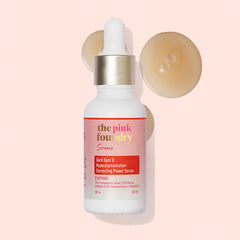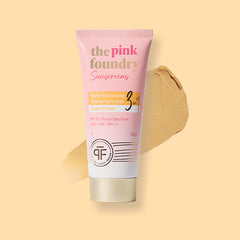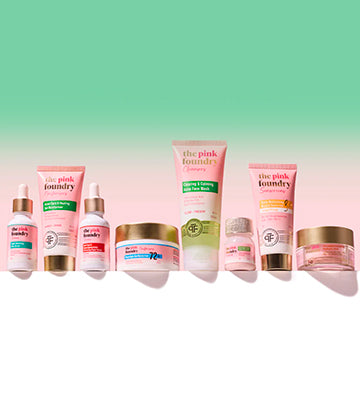D Panthenol in skincare

Introduction
The skincare industry is full of moisturising ingredients. They are essential for keeping your skin nourished and hydrated. While hyaluronic acid is well-known, another remarkable ingredient is panthenol or provitamin B5. So, let's explore what D-Panthenol is and the major D-Panthenol benefits.
What is D-Panthenol?
Panthenol is derived from vitamin B5, also known as pantothenic acid, which occurs naturally in our bodies as well as in plants and animals. Known as a pro-vitamin B5, panthenol penetrates deeper into the skin than pantothenic acid. This makes it one of the best choices for skincare.
What does D-Panthenol do in skincare products?
One thing about D-panthenol is that it has a high degree of popularity among people doing skincare because they consider it very good at moisturising. It works together with other moisturising ingredients, such as glycerin and hyaluronic acid. It helps to smooth wrinkles and fine lines while nourishing the skin so that they never form again, thereby making sure that these stay smooth over time. Furthermore, it works well for healing wounds or repairing damaged skin by creating a protective barrier on its surface to prevent moisture loss.
D-Panthenol benefits in skincare
There are a number of D-Panthenol benefits for skincare that make it a common ingredient in the industry. A few of them include:
- Skin hydration: Both forms of panthenol, D and L, are effective in hydrating the skin. They retain moisture by attracting water molecules to the skin, thus maintaining its hydration level. This property of hydration makes D-Panthenol an important constituent for those with dry or flaky skin types. By doing so, it helps to maintain natural moisture levels that keep your skin soft and supple throughout.
- Prevents trans-epidermal water loss: The loss of water from the surface of the skin called trans-epidermal water loss (TEWL) is prevented by D-Panthenol. Furthermore, it also maintains hydrated skin as much as possible so that it does not dry out after some time. It forms a protective layer which traps all the moisture inside and prevents dehydration. This aspect of creating a natural barrier becomes more important during difficult climatic conditions since excessive sweating occurs, leading to a high rate of moisture loss from the skin' s surfaces.
- Repairing damaged skin cells and wounds: D-Panthenol can restore lost moisture and immediately soothe irritated, dry skin. It is incorporated into ointments or creams for minor cuts or injuries and helps repair damaged skin cells and tissues. It can also soothe sunburns, minimise their redness and alleviate any itchiness or inflammation caused thereby serving as a perfect after-sun ingredient.
- Reduces development of wrinkles and fine lines: D-Panthenol makes the skin soft and plump, reducing the number of fine lines and wrinkles. It increases collagen and elastin production, thereby making it appear young and even in colour tone. Regular use of D-Panthenol may significantly improve skin texture and elasticity, thus making one look more youthful. This anti-ageing property explains why many wrinkle creams as well as serums contain D-Panthenol.
- Incorporates anti-inflammatory properties: D-Panthenol soothes dryness and inflammation on the skin. It also cures sunburn which can lead to redness, itching or swelling. This is an ingredient for sensitive, allergic skins with irritation because of its anti-inflammatory properties. D-Panthenol soothes your complexion, so you go back to your normal healthy look.
Precautions while using D-Panthenol
There are several precautions that should be taken into consideration when you are using products containing D-Panthenol. Some of them are mentioned below:
- Patch test: Always perform a patch test before using any new D-Panthenol-containing products to ensure it does not cause any reaction. Do a patch test on a small part of your skin in order to find out if it irritates or causes allergies.
- Skin sensitivity: Look out for any reaction that your skin may have towards this product if you have sensitive skin or often get acne. Nevertheless, it is non-comedogenic as typically considered, although it can vary.
- Avoid broken skin: These products should not come into contact with damaged or broken skin unless instructed by medical professionals.
- Eye contact: Never use products containing D-Panthenol near your eyes. In case this happens accidentally, wash well with water in that area.
- Consult with a dermatologist: If you have underlying skin issues or other concerns, talk to your dermatologist before using new D-Panthenol-containing products.
- Storage: Store D-Panthenol creams and lotions as per directions and usually in a cool, dry place so that their efficiency does not reduce.
Conclusion
D-Panthenol is a stable form of Vitamin B5 that provides superior hydration and possesses strong anti-inflammatory properties. As part of its usefulness in skincare, it aids in keeping the complexion moisturised while still always retaining its smoothness. With its repairing capability as well as its protective function, D-Panthenol can be an exceptional addition to any skincare routine. Including D-Panthenol in your daily routine can significantly improve the overall health of your skin, addressing issues like patchy surfaces and inflamed areas. It also provides protection against rapid ageing, making your skin look better than ever before.
Related Blogs

Skin Minimalism: The Simple Skincare Routine You Need
TABLE OF CONTENTS What is Skin Minimalism? Benefits of Skin Minimalism Best Minimal Skincare Routine Skin...
Continue Reading
Ethyl Ascorbic Acid vs. L Ascorbic Acid: Which Vitamin C Form is Best for Your Skin?
TABLE OF CONTENTS Ethyl Ascorbic Acid vs L Ascorbic Acid: Key Differences Benefits of Each Form of Ascorbic Acid ...
Continue Reading
Best Anti-Aging Ingredients You Should Include in Your Skincare Routine
TABLE OF CONTENTS Best Anti-Ageing Ingredients for Skin How These Ingredients Work How to Use Anti-Ageing Ingredi...
Continue Reading
How Often to Use Salicylic Acid: Finding the Right Frequency for Your Skin
TABLE OF CONTENTS How Often Should I Use Salicylic Acid Serum? How Often to Use Salicylic Acid for Specific Skin Types ...
Continue Reading















